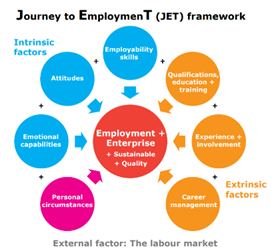Youth Employment UK’s free skills and careers programme for home educated young people has been created to meet the principles of the Journey to Employment (JET) Framework and the Gatsby Benchmarks.
The aims of this resource are to:
- Provide you an overview of the JET Framework and Gatsby Benchmarks.
- Explain how these frameworks can help you support young people with their employability skills and personal development.
How can the JET framework and Gatsby Benchmarks relate to home education?
Even a quick read through of the overviews below may quite possibly lead to you to think “That doesn’t sound like my child at all – nor would I want it to.” And that’s fine!
As a home ed parent, carer or supporter, you may find to read through the overviews below, take what fits if you think it might be useful to explore, and simply discard what doesn’t. There is no need to force a young person to fit a framework or benchmark – but you can see for yourself the areas in which they may potentially fit your child or a home educating young person you know.
You may find it useful to read through these as points of interest, rather than rules, and reframe them to fit your own experience however works best for you.
The Journey to Work (JET) Framework
The JET Framework suggests that there are seven groups of factors that contribute to successful job outcomes for young people. These include:
- Personal circumstances – this includes circumstances such as access to the internet, availability and cost of transport, disability etc.
- Emotional capabilities – these include self-esteem, autonomy, resilience and ability to engage with others. To note: The Home Education Programme does not view these all as requirements, and takes into account that they are all quite different. A child may find it a challenge to engage with others in certain situations, but still be fantastically resilient and self-confident. A child may struggle with their self-esteem for a number of reasons, but in a home ed environment they may find it much easier to be resilient and adaptable.
- Attitudes to work – having a positive attitude to work is linked to improved employment outcomes. To note: The Home Education Programme considers how a positive attitude to an activity requiring motivation of any kind, such as volunteering, a passion project, or a home education activity, can boost a young person’s attitude and confidence.
- Employability skills – these include teamwork, self-belief, communication, problem solving, and self management. To note: The Home Education Programme considers ways to explore these useful life skills in a home environment.
- Qualifications, education and training – achieving qualifications and attendance is linked with positive employment prospects. To note: This aspect of the JET framework does not take into account the ways in which a young person’s development and progress is not one-size-fits-all. The Home Education Programme does not frame qualifications as a requirement but as one possible route to personal and future development among many. The Programme also takes into account that home education follows an individual learning approach tailored to each child’s preferences and needs, which may or may not involve a curriculum and routines or set learning times.
- Experience and involvement – this includes opportunities to experience a working environment and build networks.
- Career management skills – this includes the ability to make career choices and have confidence in finding employment.
If you imagine each factor as a “bucket”, the “fullness” of each bucket can contribute to a young person’s chances of successful job and career outcomes. Our Home Education programme aims to support young people in “filling their buckets” as much as possible where appropriate, in a way that best suits their preferences and each home’s individual approach to learning.
The Gatsby Benchmarks
The Gatsby Benchmarks are eight benchmarks of good careers guidance used in schools, colleges and universities. They serve as a benchmark for improving careers provision, and research has found they have had a positive impact on a student’s career readiness and GCSE attainment. The Gatsby Benchmarks are as follows:
- A stable careers programme
- Learning from career and labour market information
- Addressing the needs of each pupil
- Linking curriculum learning to careers
- Encounters with employers and employees
- Experiences of workplaces
- Encounters with Higher and Further Education
- Personal guidance
The Home Education Programme aims to support you in supporting your child to explore careers, understand and use LMI to research careers they might be interested in, consider a wide range of future next steps, and think about ways to build experience during and after home education.
Why are These Frameworks Important and How Can they Help You?
It is so important for good career guidance to be embedded throughout education, so that young people are well equipped to make informed choices about their next steps. Having an understanding of these frameworks, and how they can support a young person in their careers awareness puts you in the best position to support your child/young person.
Home education resources












